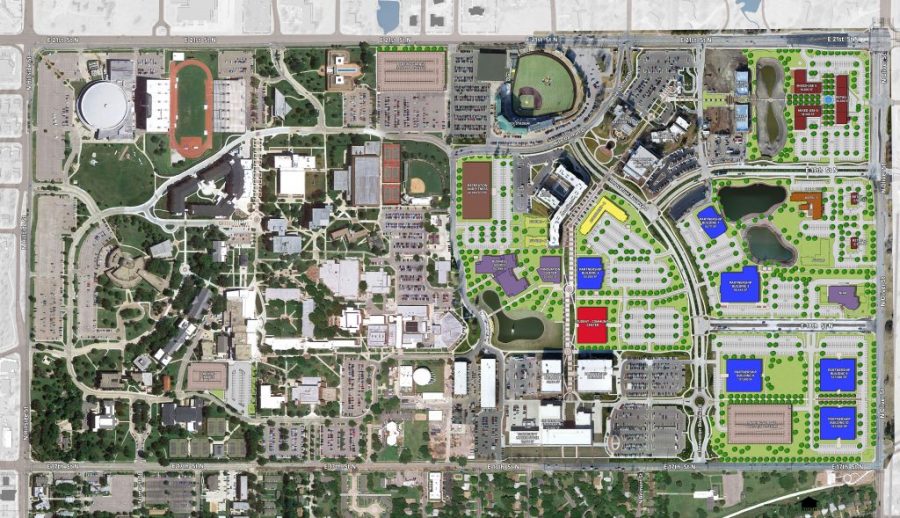Kelly: Innovation—A concept or a mindset?
Courtesy of Wichita State Innovation Campus
A map of Wichita State’s Innovation Campus.
Innovation Campus occupies 120 acres of land on the grounds of the former Braeburn Golf Course, but perhaps its most valuable piece of real estate is in the heart of Wichita State President John Bardo.
To hear Bardo tell it, Innovation Campus has transcended its physical presence at WSU since its inception in 2014.
“In the past year, the concept has grown beyond those borders,” Bardo wrote in his February newsletter on the university website. “As the original site has developed more quickly than I could have hoped or forecast, ‘Innovation Campus’ has come to mean a mindset as well as a physical place.”
And not just any mindset. To Bardo and his executive team, it has become something of a mission statement for the university.
“We’ve begun to think about Innovation Campus as any place where the university has the opportunity to put the strategic plan, vision and mission into action,” Bardo wrote.
So how did this mindset come to eclipse a physical presence, and is it a good thing for the strategic plan to become one with the spirit of Innovation Campus?
This spirit champions ideals of applied learning, public-private partnership, and community engagement. Bardo wrote that the “concept” of Innovation Campus has become a mindset within the past year, so, in judging the merit of WSU’s new strategic plan, it’s necessary to examine just what the university has achieved in that time.
WSU has successfully incorporated Wichita Area Technical College, upgraded athletic conferences, and created a host of new for-credit courses for non-degree-seeking students.
It has also leased out a privately built apartment complex before formally asking permission from the state, leased a building on campus to the Innovation Alliance the same day it was subleased to a private, Koch-family funded elementary school without Kansas Board of Regents approval, and moved forward “on good faith” with a plan to bring a YMCA and wellness center to Innovation Campus — even after a false start with student leaders and the nagging sentiment that the decision was predetermined.
And that’s becoming a problem. Innovation Campus isn’t just a place or a strategic mindset — it’s quickly becoming a crutch for the university to lean on — a guise under which questionable behavior and a lack of accountability can be easily explained away.
This singular focus on evolving higher education has led WSU’s administration to dismiss dissenting opinions, ignore conflicts of interest, and even deny objective facts — failing to hold itself to a high level of accountability.
The Sunflower’s coverage of Innovation Campus has cast a critical eye on such behavior, and subsequently, our funding has been threatened — even though, as the Faculty Senate put it in their statement to Bardo in which they unanimously voiced support for the paper, The Sunflower affords students a “unique opportunity for applied learning” that “directly aligns with WSU’s Strategic Plan.”
And yet, watchdog coverage is decried as unwillingness to accept the coming greatness of Innovation Campus.
“Tell me anything worthwhile that has ever happened in the history of the world that hasn’t been controversial,” Bardo said last October.
President Bardo, Innovation Campus should be controversial because it is a bold approach to redefining higher education at a public university — not because it repeatedly fails to meet the time-honored standards of accountability and transparency required of a first-class public university.

Matthew Kelly is a former editor-in-chief and managing editor for The Sunflower. Kelly graduated in 2020 with a bachelor’s degree in political science...









